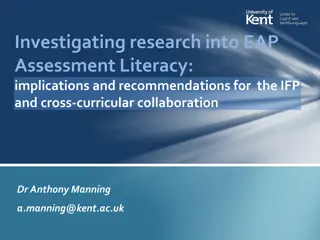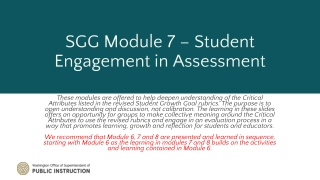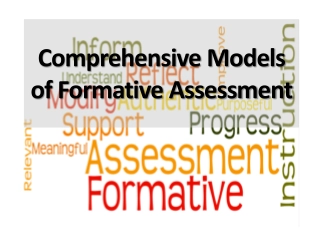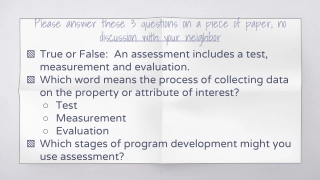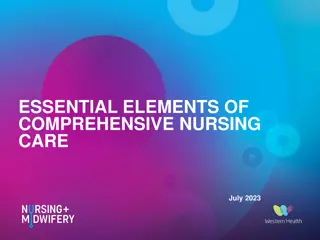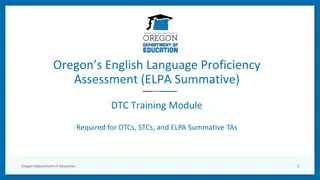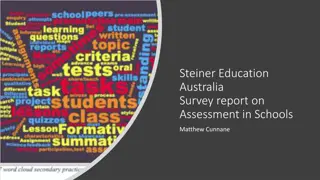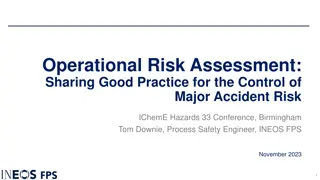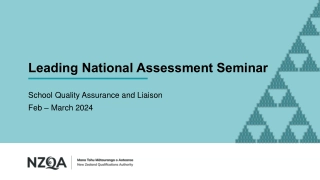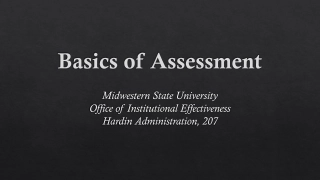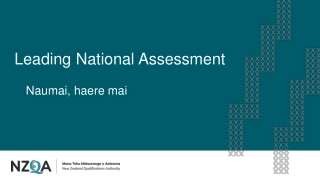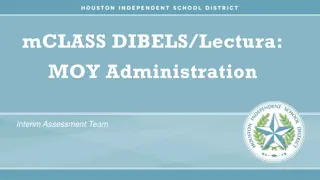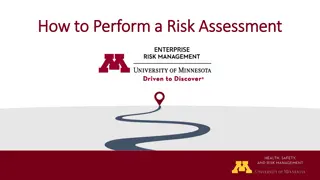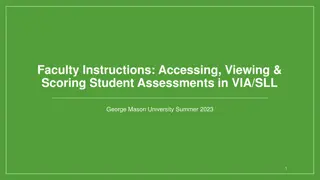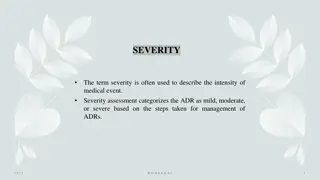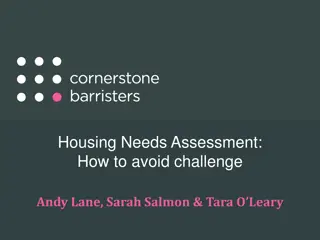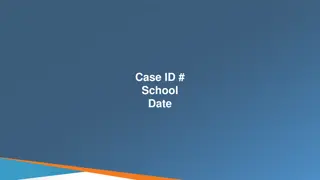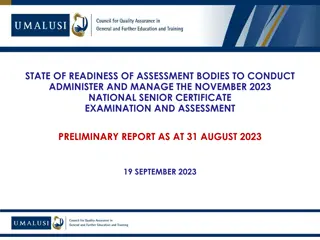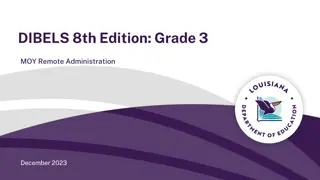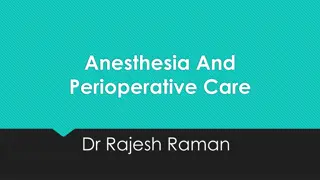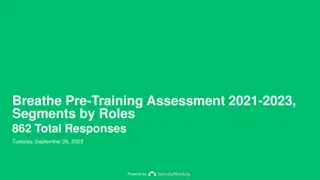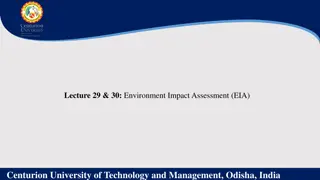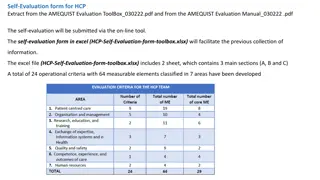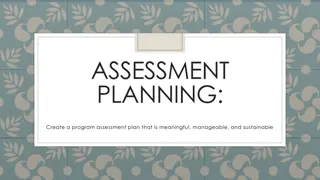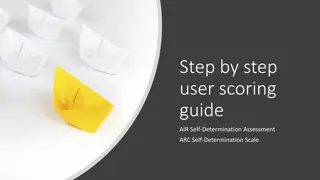Celebrate Your Assessment!
SAFAL - Structured Assessment for Analyzing Learning Orientation for Teachers. Explore the benefits of SAFAL and its role in assessing student performance on core competencies. Learn how to track progress and improve schools and teaching-learning processes.
- assessment
- learning orientation
- teachers
- progress tracking
- student performance
- core competencies
- school improvement
Download Presentation
Please find below an Image/Link to download the presentation.
The content on the website is provided AS IS for your information and personal use only. It may not be sold, licensed, or shared on other websites without obtaining consent from the author. Download presentation by click this link. If you encounter any issues during the download, it is possible that the publisher has removed the file from their server.
Presentation Transcript
Celebrate your Assessment Celebrate your Assessment
SAFAL Structured Assessment for Analyzing Learning Orientation for Teachers
AGENDA FOR THE MEETING What is SAFAL. Why is SAFAL. 01 02 Benefits of SAFAL Role of Teachers 03 04
Relevant sections from National Education Policy 2020 pertaining to assessments at key stages: To track progress throughout the school years, and not just at the end of Grades 10 and 12 - for the benefit of students, parents, teachers, principals, and the entire schooling system in planning improvements to schools and teaching-learning processes - all students will take school examinations in Grades 3, 5, and 8 which will be conducted by the appropriate authority. These examinations would test achievement of basic learning outcomes, through assessment of core concepts and knowledge from the national and local curricula, along with relevant higher-order skills and application of knowledge in real-life situations, rather than rote memorization
Why SAFAL Measure effectiveness of Learning system Assess School level performance on key competencies and proficiency levels The assessment of core competencies Assist schools by providing a reliable and comparable absolute measure of learning for parents, schools and state officials to assess school performance on core concepts Develop formal protocol and collect valid and reliable data to chart performance on competencies Systematic monitoring and reporting of learning levels Monitor the progress
Cognitive development of an individual Class 3 Class 5 Class 8 Class 10 &12 Age 1-3 Preparation for Secondary Bargaining power of suppliers All Major Development Certification LSRW Preparatory stage for Secondary Education basic literacy, numeracy, and other foundational skills. Exams provide student level performance data on key academic subjects, and is used to rank individual students on their performance Divergent Thinking Risk Taking Innovative Idea Cognitive Social relation Psychomotor
SIMILAR TYPES OF TESTS ALL OVER THE WORLD
Features of SAFAL ASSESSMENT Core Test Core concepts competency 1 Move away from rote Learning Develop futuristic school Shift from rote learning COMPETENCY-BASED LEARNING 2 Aware about learning outcomes and develop re;ated cpmpetencies Expected learning outcomes Know the level of learning SAFAL Allowing students to demonstrate understanding and mastery of knowledge and skills they are expected to learn as they progress through the curriculum 3 Shift from traditional teaching system Report to school, students and parents Diagnostic reporting Reports proportion of students at each proficiency level across grade level competencies and provide detailed diagnostic feedback to identify learning gaps. Test core concepts 4
O F F I C E R E O P E N I N G G U I D E Your School What are the benefits 1. System-level assessments or evaluations for SAFAL schools, regions, or national education system 2. To know about the real performance and Corrective measures 3. Preparation for PISA Participation 4. To Know where we are?
HOW CAN SCHOLS USE SAFAL? 2 1 To identify areas of focus and guide schools towards improving their learning levels. The assessment will provide diagnostic information to schools on core competencies. 5 4 3 To know how much we are successful in learning outcomes School performance on predetermined competencies proficiency levels, can be used by school systems, managements, parents to improve learning outcomes and Compare our performance with national level performance At t a i n i n g D e f i n i n g E xe c u t i n g How learning outcomes are implementing through teaching learning strategies Defining and setting learning outcomes. school and How they are attaining
S I M P E R I N G A S S E S S M E N T A N D E V A L U A T I O N WHY SIMPERING IS OUR PARTNER IN SAFAL Highlight 02 Highlight 01 2012 onwards providing assessment tools and training to various schools of India 2 2018 onwards conducting similar type of Assessment 1 as NLBA Highlight 04 We are the one among 500 schools selected for this opportunity 4 Highlight 03 Largest Network of experienced Teachers 3
Systematic shift from Online to Offline Assessment Setting chapter wise competency Assessment Tools STRATEGIES WILL BE USED What strategies will be used to implement SAFAL preparatory examination Strategies Systematic Implement ation of various pattern of questions to students Chapter wise Offline/Online Assessment
BENCHMARKING METHODOLOGY Identifying various types of questions Conducting SAFAL Preparatory Examination Corrective measures in teaching and assessing Identifying learning outcomes Activity oriented teaching Preparing students asper schedule Reviewing Performance CBSE SAFAL EXAMINATION Measure own performance BENCHMARKING PHASE POST-BENCHMARKING PHASE
What Simpering Offers YES NO 01 Schedule of examination 02 Syllabus Breakup SIMPERING ASSESSMENT AND EVALUATION 03 Question papers 04 Online Correction 05 Offline correction 06 Model question 07 Report
For more details www.ssaerc.com





